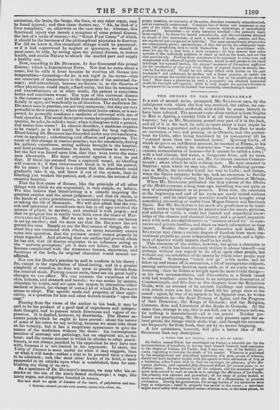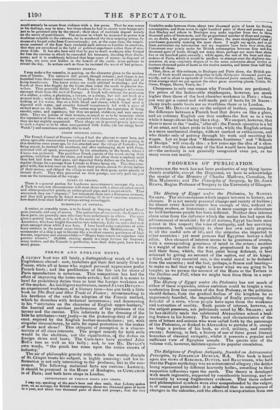THE SHORES OF THE MEDITERRANEAN
Is a sort of second series, prompted, Mr. ST.ANDISH says, by the indulgence with which the first was received, but rather, we con- ceive, by the cacoethes scribendi, with which he seems latterly to have been infected. The present route of our author is from Naples to Bari in Apulia, a country little if at all traversed by common tourists; but as Mr. STANDISH passed over part of it in the dark, and all of it in the mail, he tells no more about it than might he learned from a gazetteer and a guide-book. From Bari he made an excursion or two, and passing on to Otranto, took the packet- boat for Corfu, after being tantalized by its non-arrival till he " counted more than two hundred hours." Quitting Corfu, of which he gives an indifferent account, he touched at Patras, in his way to Athens; which he characterizes " as a miserable, dirty, ruinous accumulation of houses—for it cannot be called a town ;" with a bad climate, bad water, a dangerous fever, and no trees. After a couple of chapters at sea, Mr. STANDISH reaches Constan- tinople ; about which he tells nothing new. He next steamed to Smyrna ; upon which we may say, ditto. After suffering quaran-
tine at Malta, the traveller found his way to Cadiz; and thence, when the Opera company broke up, took an excursion to Seville and Granada ; finally closing his Odyssean expedition at Malaga..
When Mr. STANDISH published the first volume of the Shores of the Mediterranean, a long time ago, travelling was not quite so easy of accomplishment as at present. Even now, the countries at the beginning anti end of his route are rarely visited without
necessity ; and an intelligent traveller would have brought away something interesting or useful from Magna Griecia and Southern
Spain. But Mr. STANDISH i6 too much of a gentleman to be intel-
ligent ; unless by intelligence be meant a taste for music, pictures, and articles of vertil, a ready but limited and superficial know- ledge of the classics and classical history, and a general acquaint- ance with such accomplishments as "masters attend for' in semi- naries and private families, and about as much information as they impart. Besides these qualities of education and habit, Mr.
STANDISH may claim a certain degree of freedom from mere con-
ventional prejudices, some independence of judginent, and a light- ness of manner which imparts itself to his style.
This character of the author, however, has given a character to his book ; which has been obviously written to please himself—not perhaps without any regard to its effect upon other people, but without any consideration of the means by which other people may be affected. Sometimes "touch and go" is his motto, and he takes up and tosses off in succession, a lot of incongruous subjects,. passing authoritative decision upon each, as if an oracle were an. nouncing : then he dilates at length upon the most trivial things— as his own accommodation, and discomforts, in a Greek vessel with bad weather: anon he turns to an antiquarian description of Constantinople, and fills four or five chapters from the Byzantine Guide, with an account of its ancient buildings and curiosities, with which every one has been dosed till his gorge rises at the sound : again, by way of an episode to his Spanish tour, he writes three chapters on—the Arab Princes of Spain, and the Progress of their Dominion; the Kings of Granada ; and the Religion, Customs, Arts, and Literature of the Arabs in Granada. At the same time, strange to say, this is not dull, nor is it always tedious, for nothing is manufactured—all is con amore. Neither pro- found nor penetrating, Mr. STANDISH only pounces upon the sa- lient points, the things which strike him ; and though his accounts are frequently far from fresh, they are by no means fatiguing. A few quotations, however, will give a better idea of Mr. STANDISH than any description.
A WORD FOR ALI PACIIA, AND A BIT OF LOGIC.
An Italian named Pirini has established (at Patras) a tolerable inn for the accommodation of travellers, he having been himself formerly head coachman to the despot of Yanina, Ali Puha; and, I may say, one of his faithful ser- vants, regretting to this day the death of his master. Whatever is published by the unenlightened and prejudiced concerning this petty prince of Albania, should not have exclusive weight with Einopeans in their estirnation of himas a barbarian, when I state that he had ten carriages for pleasure, of the Eu- ropean fashion, and expended fifty thousand dollars for several years la as Italian opera. He was beloved by all his subjects, and hie moments of anger never were carried to such an excess as to estrange the affections of his friea6. His urbanity was extreme and proverbial ; all his steps of policy tended, as much as was possibly consistent with the ideas of a Mussularan, to promote civilization. During his government, the savage hordes of his territories were kept in subjection; under it, property was sacred to the owner ; a merchant might travel safely with uncounted sums—whereas now, in the same plates, he
would scarcely be secure from violence with a few pares. That he was severe in his dealings, may be true; but those whom he had to coerce were beings sub. ject to be governed only by the sword ; their ideas of rectitude depend mainly on the terror of punishment. The manner in which he mounted to power was doubtless culpable in the extreme, for he murdered the then reigning prince, by meansof a forged order from Constantinople; yet, at the same time, the treach- erous customs of the East have rendered such actions so familiar to courtiers, that they are considered in the light of political expedient rather than of atro- cious deeds. It has also been said that he put to death workmen who formed for him the cavities in which he concealed his treasures, dreading their diselo- sum; and it is confidently believed that large sums of money, so disposed of by him, are even now hidden in the bowels of the earth, never perhaps to revisit the day. In actions such as these he imitated the worst of bad princes.
MODERN GREEKS.
I may make a few remarks, in passing, on the character given to the modern race of Greeks. The nation is still proud, though reduced ; and shame is not banished from their mental constitution. They are accused of bad faith and of being treacherous. The lower orders are much addicted to stealing ; and the bands of those who fought for the Cross often infest the roads to plunder tra- veller.. They generally dislike the Franks, that is, those strangers who come amongst them from the wet of Europe. A Greek will embrace the profession of a soldier, a sailor, a physician, a lawyer, or a divine but will not work at a manual trade ; with a few dollars in his pocket he will open a shop, sit all day looking at his wares, dine on a little bread and cheese, which frugal meal is digested with water' and consider himself ptuously fed with a piece of stewed meat on the Sabbath. The nation may merit the reputation of being careful, sober, and ingenious; but they are proud, stubborn, and very suscep- tible. They are jealous of their women, so much so as to he tenacious about the reputation of those who are not connected with theme-elves, and with whom they are but slightly acquainted. Their clergy ire in general grossly ignorant, to such a degree as to be often unacquainted with Latin, (do our clergy kcow Welsh?) and sometime* scarcely able to read.
GREEK MEETING GREEK.
The French Consul of Preens' (whom I had the pleamire to meet here, and whose agreeable conversation I enjoyed for aonie hours) told me, that passing in this direction some years ago, he was attacked near the village of Lutraki ; but being armed, he resisted his assailants' and after exchanging shots with them, retreated with all speed, accompanied by his attendants to the beach, where a felucca was anchored. The perfidious Greek captain (settle vessel, seeing their position, withdrew from the shore, and would not allow them to embark until they had laid down their guns, and deposited thirty dollars on the beach ; the regular charge for a passage from Lutraki to Patras being six. This they com- plied with, but when once on board, drew their pistols, retook the thirty dollars of their money, and obliged the villain to send for their guns, under penalty of instant death. They then proceeded on their passage, and only paid the jUSI MUD on the termination of the voyage.
TURKS IN PERSON.
There is a general passion for handsome accoutrements amongst the men. A Turk in very low circumstances will strut about with a silver.sheathed sword and silver.ponintelled pistols, an amber-pieced pipe, and a smart switch. Thus accoutred, they are " elegants ;" but transmute them into a European costume, and they will generally be found mean-looking, ill aSseped creatures creatures, bow-kneed from their habit of always sitting cross-legged.
EUROPEANS AT SMYRNA.
A casino, or assembly-room, is to be found at Smyrna, supplied with Euro- pean journals, and easy of access. The authorities of our nation, the Consuls in theseparts, are generally men who have been unfortunate in others. The navy gives a general tone, such as it is, to the society of a Tierkish sea-port. The Americans, who have fought themselves into notoriety, fight on, and a duel took place amongst them while I was here. I have heard some complaints of arbi- trary conduct in the naval corps during my stay in the Mediterranean. The commander of a ship is apt to become like a resident country gentleman of high descent, imperious and uncontrollable—" Magna fama tamen eat cujusdam nue paterno Yu/et:dia." 30,0001. sterling money is a large fortune for Smyrna; many traders, and the Consuls in particular, were their debts paid, have not as many pence.



























 Previous page
Previous page